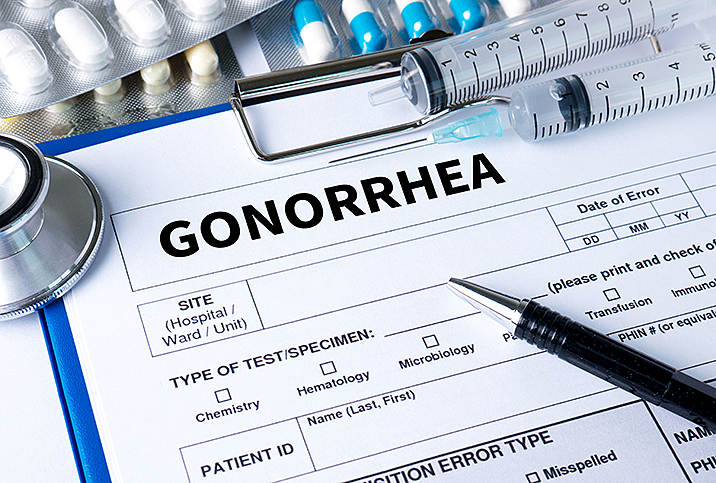Studies: Meningitis Vaccine May Provide Protection Against Gonorrhea

Gonorrhea is the second most prevalent bacterial sexually transmitted disease (STD) in the United States. The Centers for Disease Control and Prevention (CDC) estimated that more than 1.6 million new cases occurred in 2018, more than half of those among people ages 15 to 24. There were an estimated 86.9 million cases worldwide in 2016.
Any effort at slowing the spread of gonococcal infection is beneficial. This sets a welcoming stage for a 2022 report on three studies that examined correlations between a meningitis vaccine and decreasing gonorrhea rates. The findings, published in the Lancet Infectious Diseases journal, are impressive.
One observational study focused on South Australia's vaccination program with 4CMenB, a meningitis vaccine. More than 53,000 adolescents and young adults received at least one dose of 4CMenB during the program's first two years. In adolescents and young adults, a two-dose course of 4CMenB was 33 percent effective against gonorrhea, the study authors reported.
In another observational study using health records of young people from New York City and Philadelphia, the authors estimated that two doses of 4CMenB provided 40 percent protection against gonorrhea, while one dose provided 26 percent protection.
The study disclaimer
Monte Swarup, M.D., a board-certified OB-GYN in Chandler, Arizona, and founder of HPD Rx, isn't completely convinced of the findings.
"It is an association only and needs further research with the vaccine to answer this question," he said. "Not just an association."
Swarup has a point. These are associations gleaned from trends in data.
Brian Labus, Ph.D., M.P.H., an assistant professor of epidemiology and biostatistics at the University of Nevada, Las Vegas, explained what would have to occur for this information to mature into medical evidence.
"It takes repeated studies using different approaches under different conditions all reaching similar conclusions before we can reach a consensus on any given topic," Labus said. "We can conduct different studies with other existing data sets to confirm these results and we can collect new data that is specifically designed to evaluate the level of cross-protection provided."
Even so, Labus is intrigued by the report's suggestions.
"These findings are very interesting and could present an opportunity to help control a disease with increasing drug resistance," he noted. "Because gonorrhea is such a common disease, even a small percentage decrease can mean we have prevented a large number of cases at the population level."
A word of hope and a word of warning
A meningitis vaccine providing additional STD protection would be a massive boon, especially as gonorrhea adapts to be potentially drug-resistant. The CDC acknowledges that its reported statistics of annual cases of gonorrhea are undoubtedly low as the STD often remains asymptomatic in a carrier and goes unreported.
This is another point of hope, as the meningitis shot is very common. People may not think to get tested for sexually transmitted infections (STIs), but many organizations and schools require the meningitis shot.
From a governmental standpoint, it's only good news. One of the studies estimated that if the meningitis vaccine were to double as protection against gonorrhea, 110,000 cases of the disease could be avoided, saving health agencies $10.4 million across a decade. This was a British study, and the population of the United Kingdom is about one-fifth of the United States, so the U.S. might see higher numbers.
However, if wealthier nations overestimate the role of the meningitis vaccine, they may cut vital costs in medical aid to less wealthy countries. Paired with less access to STI prevention, this could be catastrophic.
That's all before considering that there are two different vaccines against meningitis available in the U.S.: MenB and MenACWY. The research news applies only to the MenB meningitis shot. If someone were to receive the other type and not realize the difference, they may falsely believe themselves to be immune.
This brings up another shortcoming epidemiologists often see. Would people engage in riskier behavior (in this case, unsafe sex) if they think there's a lower chance of contracting an illness?
The scientific reasoning
One of the strengths of the studies is that people weren't tested in artificial circumstances; researchers analyzed existing data of individuals who received meningitis vaccines following conventional scheduling. This better reflects real-world circumstances.
Labus explained that not only is this news promising, different versions of the same phenomenon are occurring.
"We have seen the vaccine used to prevent tuberculosis providing some protection against a variety of unrelated infections because of the way that it trains our innate immune system," he explained. "There is also an intentional example of this playing out around the world right now. We use the smallpox vaccine to protect against monkeypox because they are closely related organisms."
Similarly, and underpinning the studies' findings, meningitis and gonorrhea are related, Labus continued.
"While meningitis and gonorrhea are very different clinical illnesses, the organisms that cause both of them are closely related," he said. "They are basically siblings: Neisseria meningitidis and Neisseria gonorrhoeae."
The two organisms share a name because they belong to the family of Neisseria bacteria. The genus overall contains 17 different species, but only two of the strains cause diseases in mammals. The other 15 are considered commensals, meaning the bacteria colonize mucus membranes but aren't strong enough to cause illness.
Even with all the possibilities discussed, not much is going to change for us laypeople. Condoms are still your best friend. Even if down the road we discover that the meningitis connection is more than an association, 40 percent protection is far from ironclad. Traditional safer sex practices are still the wisest plan of attack.


















